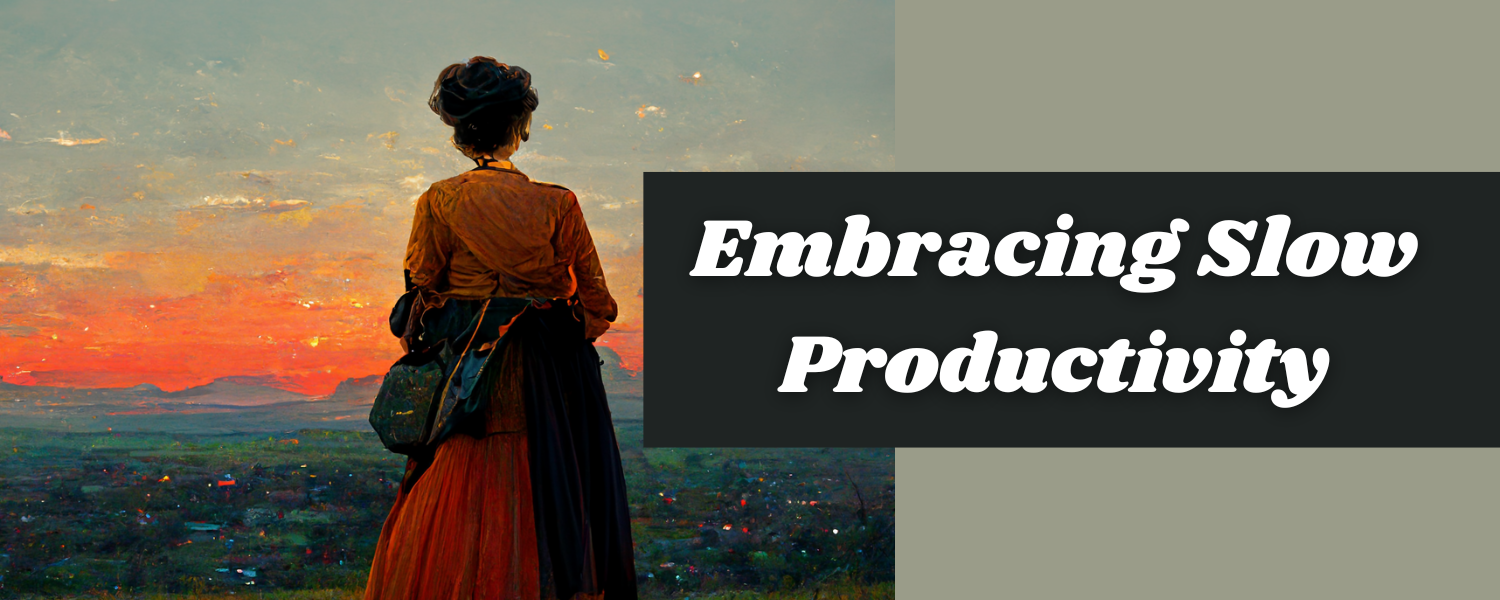- Published on
Embracing Slow Productivity
- Authors

- Name
- Will
- @productive_will

What is slow productivity?
We all have an idea of what productivity is. It seems to boil down to “how can we get more done in less time?”
This doesn't address the internal change that needs to happen though. Why do we want to be productive? Why do we need to be productive?
Slow productivity is doing everything you need to do but with intention and at a sustainable speed. Success is only success if you're physically healthy, mentally present, and in a good enough place to enjoy it with our loved ones.
Reduce your work
The first step to embracing slow productivity is to reduce the total amount of work we take on at any given time. Taking on more work than we can handle leads to all sorts of mental and physical problems.
The old way of working is broken. People are reporting higher levels of stress and more instances of burnout. Slow Productivity could be the answer. Cal Newport seems to think it is. Check out his article: It's Time to Embrace Slow Productivity
We often don't think of Slack or email as productivity killers, but that's exactly what they can become. People demand your immediate attention with Slack messages. They send you emails with "Urgent" in the subject line. These small interruptions can quickly add to our volume of work in a typical day.
Lots of people are talking about a 4-day work week. That sounds nice in theory. But if your volume of work is too high, a shorter work week won't help you.
Look at your work week. Are to taking on too much work? Focusing on one task at a time will help you complete work faster, better and with less stress.
Manage your time
The next step in our slow productivity journey is to manage our time better.
As we shifted away from religion during the industrial revolution, we started to get obsessed with time management. Better time management meant more output from the factory. But that's not the world we live in today.
A lot of us work from home. We have endless opportunities for procrastination. Procrastination is not a bad thing. It's a human tendency and is inevitable. We should become better procrastinators. Time management is another way of saying we should prioritise our most important goals.
We can also manage our time better by avoiding second-tier priorities. We don't have time to do everything. Learn how to say no. This follows the same thinking as Derek Sivers' Hell Yeah or No book.
Our time here on Earth is not endless. But that's ok. Our finitude defines our existence. Most of us avoid this fact.
The German philosopher Martin Heidegger calls this "falling". We seek distractions. We follow a prescriptive existence. According to Heideggar, to live an authentic life, we have to face our finitude.
The philosopher Martin Hägglund goes on a Summer vacation with his extended family every year. The key to the joy to these vacations is that they're limited. The coastline is temporary. The family members are temporary. But they exist now, on that vacation. Keeping that in mind is what makes the holiday special.
Every choice about what to do with your time requires sacrifices. This is why it's important to have your choices tend towards what matters most to you. Manage your time. It's yours.
Digital minimalism
Digital minimalism and slow productivity are linked. To start moving towards slow productivity, we'll have to change the way we interact and use our devices.
Deployed properly, tech can give us a huge boost to our quality of life.
Cal Newport recommends taking 30 days and stepping away from all the optional technology in your life. You'll gain more time. You can use that time to reflect and answer the deeper questions of life. What are your values? How do you want to spend your days?
Solitude, boredom, real-world conversations, and physical activities are all pushed to the side when we use screens. We should embrace slow productivity with stillness. Stillness is being able to sit anywhere by yourself, hear the silence, and just exist.
Stillness is the key
Winston Churchill's physical activity of choice was bricklaying. He found the mixing of mortar and brick stacking meditative. He also painted. Both these activities were escapes from the constant intellectualism.
William Ewart Gladstone took up chopping down trees.
John Cage became a mushroom hunter.
What physical activity might help release you from the pressures from your work or life, and find the stillness that those others found?
Know your limits. Embrace moderation on the route to stillness. Take naps. The work will still be there when you wake up.
In conclusion
If you're feeling stressed and like you don't have enough time, slow productivity could be the answer.
- Reduce the amount of work you take on
- Learn how to say no and prioritise your time
- Take a 30-day digital detox to help reset your relationship with technology
- Get comfortable with stillness and boredom
- Take up a physical hobby
- Make the most of the time you have
This article was written based on what I learned in a Blinkist guide called Save Your Sanity With Slow Productivity. You can check it out here: Blinkist: Serving curious minds.